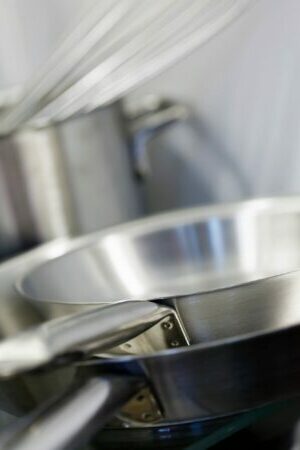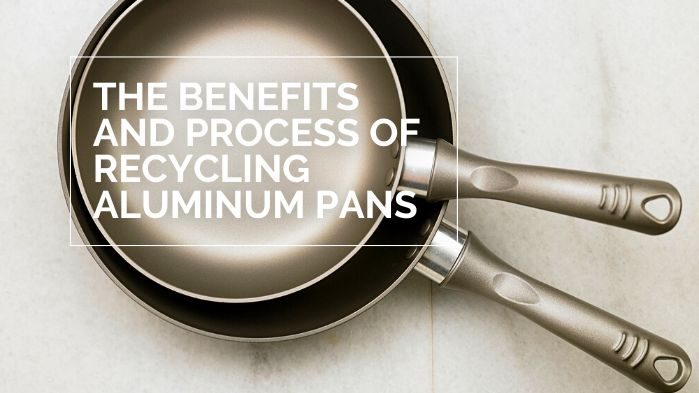Aluminum pans can be recycled. Aluminum is one of the most recyclable materials, as it can be recycled indefinitely without losing quality.
When aluminum is recycled, it takes just 5% of the energy required to produce it from raw materials. Recycling aluminum also helps conserve natural resources, such as bauxite, used to make aluminum. To recycle aluminum pans, you can bring them to a recycling center or place them in your curbside recycling bin if your community has one.
How to Recycle Aluminum Pans
Recycling aluminum pans is easy and can be done through various methods. Here are some steps to follow:
- Make sure the pan is clean and dry.
- Check if the pan is made of aluminum. Some pans may be made of other materials, such as steel or non-stick coatings, which cannot be recycled with aluminum.
- Check if your community has a curbside recycling program that accepts aluminum. If so, you can place the pan in your recycling bin on the designated pickup day.
- You can bring the pan to a recycling center if your community does not have curbside recycling. You can search online or call your local waste management company to find the nearest recycling center that accepts aluminum.
- The pan will be sorted and processed with other aluminum items at the recycling center. It will be melted down and formed into new products, such as aluminum sheets or blocks.
Recycling your aluminum pans can help conserve natural resources, reduce energy consumption, and reduce the amount of waste sent to landfills.

Where to Bring Aluminum Pans for Recycling
There are several places where you can bring aluminum pans for recycling. Here are some options:
- Curbside recycling: Many communities offer curbside recycling programs that allow you to place recyclable materials, including aluminum pans, in a special bin that the waste management company collects. Check with your local government or waste management company to see if this service is available.
- Recycling centers: Many recycling centers accept aluminum pans and other types of aluminum. You can search online or call your local waste management company to find the nearest recycling center that accepts aluminum.
- Scrap metal yards: Some scrap metal yards also accept aluminum pans and other items. You can search online or call local scrap yards to see if they accept aluminum and find their hours and other requirements.
- Retail stores: Some stores, such as home improvement and appliance stores, have recycling programs for specific items, including aluminum pans. You can check with the store to see if they accept aluminum pans and their recycling policies.
- Special events: Some communities or organizations hold special occasions, such as “e-waste” collections or hazardous waste drop-off days, where residents can bring various items, including aluminum pans, for recycling. These events are often advertised in local newspapers or on the community’s website.
How Aluminum Pans are Recycled
The recycling process for aluminum pans follows these steps:
- Collection: Aluminum pans are collected from recycling bins, recycling centers, and other locations where they are dropped off for recycling.
- Sorting: The collected aluminum pans are sorted by type and grade. They are then cleaned to remove contaminants, such as food residue or labels.
- Shredding: The sorted and cleaned aluminum pans are shredded into small pieces. This makes it easier to transport and process the material.
- Melting: The shredded aluminum is then melted in a furnace. The temperature of the furnace is carefully controlled to ensure that the aluminum is melted but not damaged.
- Molding: The melted aluminum is poured into molds to create new products, such as aluminum sheets or blocks. These products can be used to make a wide variety of items, including automotive parts, construction materials, and consumer goods.
- Quality control: The new aluminum products are inspected for quality and purity before being sold to manufacturers or other users.
By recycling aluminum pans, we can conserve natural resources, reduce energy consumption, and reduce the amount of waste sent to landfills. This helps to create a more sustainable society and a healthier planet for future generations.
The Positive Effect of Recycling Aluminum
Recycling aluminum has many positive effects on the environment and the economy. Here are some benefits of recycling aluminum:
- Conservation of natural resources: Recycling aluminum conserves natural resources, such as bauxite, used to make aluminum. Recycling aluminum takes less energy and resources than extracting it from raw materials.
- Reduction of greenhouse gas emissions: Recycling aluminum reduces greenhouse gas emissions, as it requires less energy to process recycled aluminum than to produce it from raw materials. This helps to reduce the overall carbon footprint of the aluminum industry.
- Energy savings: Recycling aluminum requires just 5% of the energy needed to produce it from raw materials. This results in significant energy savings and a corresponding reduction in the use of fossil fuels.
- Reduction of waste: Recycling aluminum helps to reduce the amount of waste sent to landfills. This conserves landfill space and reduces waste disposal’s environmental impact, such as methane emissions.
- Economic benefits: Recycling aluminum generates jobs and contributes to the economy. The aluminum recycling industry is a significant source of employment and generates billions of dollars in revenue each year.
- Increased sustainability: Recycling aluminum helps to create a more sustainable society by conserving resources, reducing energy consumption, and reducing waste. This can help to create a healthier and more livable planet for future generations.
Conclusion
Recycling aluminum pans has many benefits for the environment and the economy. It conserves natural resources, reduces greenhouse gas emissions, saves energy, reduces waste, and generates jobs and revenue.
Recycling aluminum is easy and can be done through various methods, such as curbside recycling, recycling centers, scrap metal yards, retail stores, and special events. Recycling involves collecting, sorting, shredding, melting, molding, and quality control. By recycling aluminum pans, we can all play a role in creating a more sustainable society and a healthier planet.

